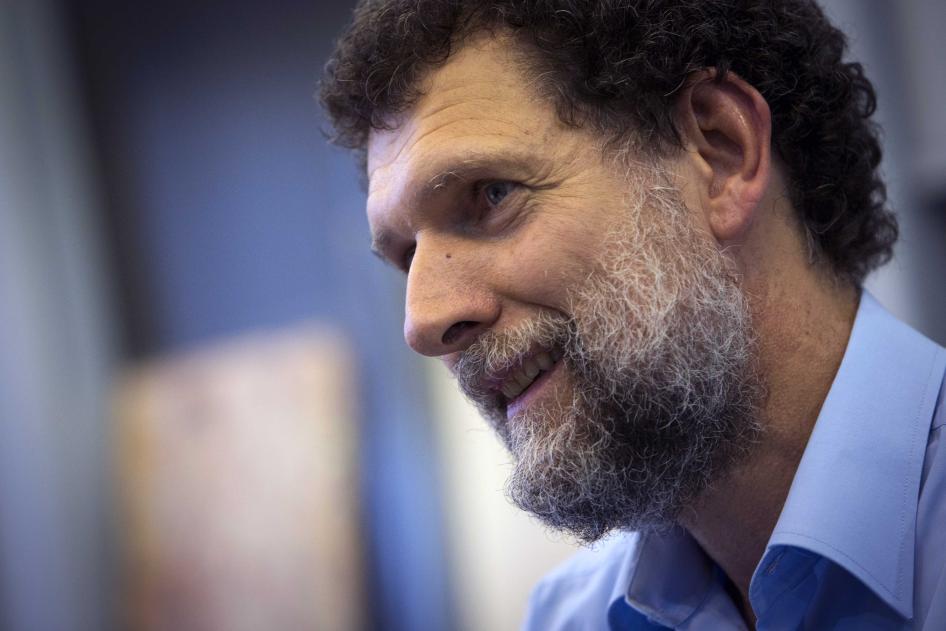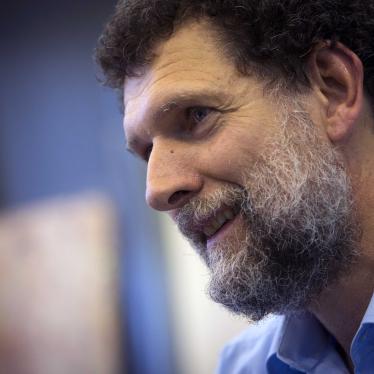Officially the verdict handed down on September 28 against the human rights defender Osman Kavala and four others was reached by Turkey’s top court of appeal. However it was pronounced well in advance, in speech after speech, by the country’s president.
The verdict is a horrifying demonstration of the autocratic path Turkey has taken under the Erdogan presidency. Kavala faces a sentence of life in prison without parole, and the four others tried with him face 18 years, in connection with mass protests a decade ago in Istanbul’s Gezi Park.
The case shows us that wild conspiracy theory and an appetite for scapegoating people in show trials have become a means of keeping in check anyone in Turkey inclined to question authority.
The case also has international ramifications, demonstrating that Turkey is intent on crushing the aspirations of its European and US allies to be able to trust Turkey as a partner that respects the rule of law and shared fundamental value systems. Instead, it is endlessly testing the limits of what it can get away with by riding rough shod over basic human rights and creating maximum legal unpredictability. The brinkmanship and defiance Turkey has demonstrated over this case is part of a broader trend of Ankara choosing to take an unpredictable line on issues of international importance to extract other concessions.
For the UK, it is clear that the new Foreign Secretary David Cameron will have many pressing issues, including Britain’s positions on the Israel-Hamas war and Ukraine conflict in his in-tray. However it is crucial for Cameron to engage with Turkey on its record of serious human rights abuses and in particular the case involving Kavala.
The Gezi trial at the heart of the case is based on a fictional rewriting of completely spontaneous and unplanned protests against the government. These have been perversely and blatantly falsely recast as a conspiracy by one man to overthrow it.
As a businessman Osman Kavala inherited his father’s group of companies, but he is known above all for his civil society work through his association Anadolu Kültür (Anatolian Culture) supporting the arts as a medium for civic engagement and societal dialogue. Hardly political activism, and absolutely nothing to do with street protest.
The European Court of Human Rights has twice ruled that Kavala should be released from prison and that there was no evidence to support the charges against him or by default the others. Most significantly, the European Court concluded that the detention itself was politically motivated.
Turkey’s failure to release Kavala and drop the case led the Council of Europe in February 2022 to trigger a sanction process against Turkey. This “infringement procedure” is serious, and rare, only having been used once before, against Azerbaijan. Despite this, just two months later Kavala and the others were convicted, and those convictions are now final.
While President Recep Tayyip Erdoğan has completely disregarded the binding judgments of the European Court of Human Rights, the glacial pace of the infringement procedure has meant that Turkey’s defiant behavior has yet to result in any actual consequences, such as losing voting rights at the Parliamentary Assembly of the Council of Europe and other penalties short of expulsion from the bloc.
Turkey’s broader strategy of extracting concessions has been clear. After Russia’s invasion of Ukraine and the expedited NATO membership process for Sweden and Finland, Erdoğan first held up the process for both, then insisted that ratification of Sweden’s membership was conditional on it cracking down on certain Kurds and supporters of US-based cleric Fethullah Gülen living in Sweden whom Turkey regards as terrorists.
He then stole the limelight at the July NATO summit in Vilnius to suggest that ratification was imminent, before again delaying the process with vague suggestions that Sweden had not yet met the conditions and that Turkey’s parliament would decide.
Turkey also relies on the fact that Russia’s exit from the European Court of Human Rights and the Council of Europe after the invasion of Ukraine has diminished the appetite in Europe for deepening conflict with Turkey.
And yet, while these spoiling efforts continue, Turkey is facing a deepening economic crisis, has not managed to curb hyperinflation and, as most analysts agree, is in deep need of winning US and European direct investment in addition to that recently procured from Gulf states. Erdoğan was in New York earlier in September for the United Nations annual meetings and joined Treasury and Finance Minister Mehmet Şimşek in trying to court banks and finance companies.
What can be the success of such efforts to secure long-term investment when such investors, seeking predictability and stability, see Turkey’s courts ignore the rule of law and produce blatantly unfounded decisions to jail people like Osman Kavala at the bidding of the president?
This human rights crisis has deep consequences for people in Turkey but also risks spilling over and undermining international rule of law standards. The UK, the European Union and its member states need to resolve to put cases such as that of Kavala and his co-accused center stage when they engage at the highest levels with Turkey, and demand that the cruel verdicts against them must be vacated. It is long past time that Turkey faced real consequences for tearing up the rule book.









